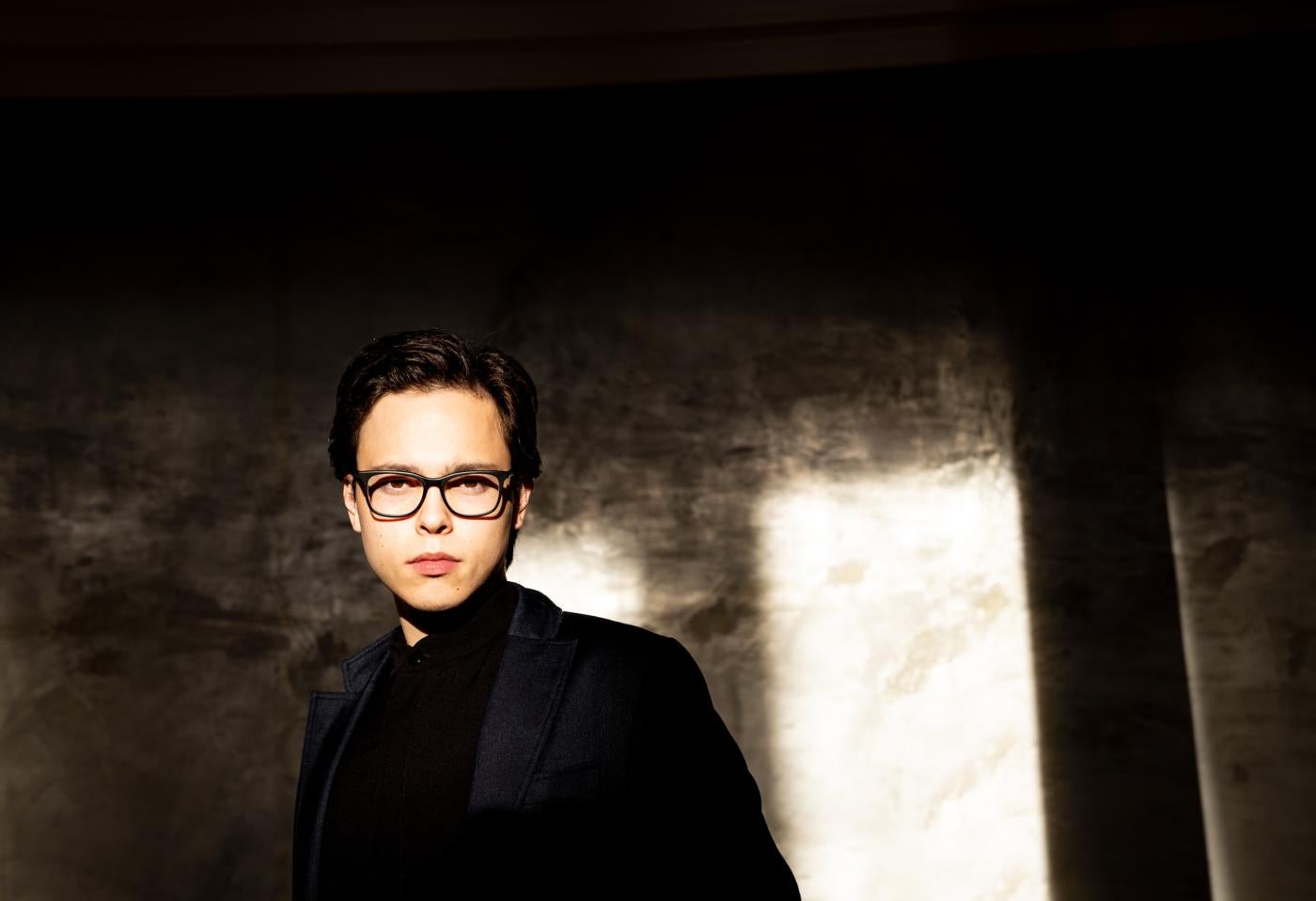The 23-year-old Finnish conductor Tarmo Peltokoski is making his NSO debut this week conducting a program featuring Wagner’s Overture to Die Meistersinger, Bartók’s “nightmarish” second piano concerto with Yuja Wang (“the Queen”) and the first symphony by Jean Sibelius. He just flew over from Rotterdam, and answered a few questions for WETA Classical, proving he is as entertaining as he is talented.
Nicole Lacroix: It is an interesting quirk of fate that you remember falling in love with Wagner as a kid when you heard a 2-minute excerpt on YouTube. Now, just a few years later, you can see yourself conducting the entire Sibelius First Symphony, the very piece you’re conducting with the NSO-- 43 minutes’ worth. How cool is that?
Tarmo Peltokoski: Yes, it is quite cool. There are much bigger works also, of course, this just happened to be picked for this week. I think I gave a list of possible symphonies I proposed and then the management of the orchestra picked this one.
NL: Another awesome development in your career is that you signed an exclusive contract with Deutsche Grammophon, just days ago. What an achievement!
TP: I'm very honored and I'm sharing the stage this week with another DG artist: The Queen. That's what I call her sometimes.
NL: As horrible as the Pandemic was, it opened a lot of paths of creativity in the art and music world. It gave artists the time to think and develop, which would be difficult in their incredibly busy lives. In fact, your big break with the Deutsche Kammerphilharmonie Bremen came during the pandemic. Can you tell us about that?
TP: Yes. So, I happened to be very lucky with the pandemic. First of all, when the lockdown happened, I spent all my time just studying music, because I had so much time so I really took advantage of the time. And then exactly three years ago, the Deutsche Kammerphilharmonie Bremen invited me to come over just to rehearse them because they weren't allowed to play concerts, but they were just rehearsing. And they wanted to get to know me, as strange as it sounds, but it clicked very well and then we started a lasting fruitful collaboration.
NL: I once asked your compatriot and colleague, conductor Dalia Stasevska (who just had a baby girl, congratulations to her) .....why Finnish conductors were so prominent in the music world, and she said she thought it was because Finland places such importance on art, artistic education and even infrastructure. Another aspect of the success of Finnish conductors, is the fact that so many are accomplished instrumentalists as well. What do you think is the key to success in this field?
TP: I don't know about the success of Finnish composers and instrumentalists. I mean, there are some of those, of course. I wouldn't say there are kind of abnormally many of those compared to other countries, but we do have our fair share of conductors much more unofficially. And that's, that's not because of infrastructures or education—that's because of the life work of Jorma Panula, our teacher who began in the 70s, and who whose first students included Esa-Pekka Salonen and Osmo Vänskä in the same class. So it's really his life's work.
NL: Speaking of piano, do you feel a certain kinship when conducting Yuja Wang...and will you treat us to a duet? Another YouTube hit?
TP: You will have to come and see. I won't reveal anything. Being or having been a pianist once upon a time, I can't play it anymore. Of course, first of all, I am just so thrilled to be on the same stage [as Yuja Wang]. Now, we've played together quite a lot already, but of course growing up she was one of my heroes. She's everyone's hero. And of course the first time was like I couldn't believe it, it felt like a fever dream. Now I'm sort of used to well, actually, no one never gets used to her but, being on the same stage with an absolute superstar of a pianist—it’s a very special thing.
NL: Bartók’s Piano Concerto No.2 is, according to Wikipedia, notorious for being one of the most difficult in the repertoire. It’s so hard that the New York Philharmonic couldn’t learn it in time for the premiere. Pianists complain of “finger-breaking...keyboard covered in blood” “nearly paralyzed hands”. Tell us your approach to this very exciting work.
TP: It is the most difficult piano concerto. It's absolutely terrifying. Nightmarish. [Yuja] picked it, not me. I tried to resist but I had to do what she said. My approach is: be thrown into the water and try to swim. It's that hard. I have to pray for mercy.
NL: The Bartók has an interesting form. What moments most speak to you and why?
TP: Of course, the only moments when I can breathe a little bit, are the slow beginning and end of the second movement. So I guess those are my favorite.
NL: Let’s move on to the Sibelius Symphony No.1. It grabs us from the very beginning with that clarinet and timpani opening. Can you share a few thoughts on the Sibelius?
TP: Well, that's a highly exciting and personal first symphony by a youngish man, composed in 1899. He wanted to show the world: "This is what I am." And it's a great piece; one of the best first symphonies there is. You can see where he's coming from, there's a lot of Tchaikovsky there, but you can also see that this is a guy who had a very strong personal voice, which is, of course, not yet fully there. But you can see that, there are the moments where you can understand where he's going. Like the opening, with just a lonely clarinet over a timpani pedal, it's a very strange way to begin your first symphony. There are many things that no one really had ever done before, like in the second movement, which is slow. He speeds up to a double tempo and then splits the tempo in half, which is a very, specifically Sibelian construction that he did many times after that. It's many, many, many things, like strange orchestration and [he was] very detailed to many parts. It’s a youthful piece. There are some angry moments as well, some very melancholic, and, of course, quintessentially Finnish.
NL: Maestro Noseda has said that he learned a lot from orchestras of different nationalities...the Russian spirit, the well-organized British and American orchestras, for example. Do you find such national differences in the approach to making music?
TP: I'm fortunate to have already four orchestras in four different countries: in Latvia, Germany, Holland, and France, and they're already all very different. This is my third week in the states. I've conducted San Diego and LA before, so I'm getting to learn the American approach. Of course, these are also very different orchestras. So yes, they are very different and inside the countries also every orchestra has a different identity.
NL: Are you enjoying yourself in your career and travels? Do you get to explore the city? What music do you listen to for fun?
TP: For fun, I listen to Wagner or to Mahler, or whatever I'm doing next week, or two years from now.
I am enjoying my life, which is traveling all the time and conducting every week and very rarely having weeks off. I have a week off after next week. And the last time I had a free week at home was in April. So that's sort of how it is. This trip yesterday I came from Rotterdam went very well. I don't feel jet lagged, actually. So this is going well. Surprisingly. I only woke up at five which is quite good. Sometimes it's much worse. Yeah, I'm so fortunate and grateful to be doing this so I shouldn't complain.
NL: Thank you so much for taking the time to chat with WETA Classical. Is there anything else you would like to add to this conversation?
TP: Well, the concert opens with Wagner which is just the best. Wagner is my favorite of all.
Program:
Thursday, November 9, 7 p.m.
Saturday, November 11, 8 p.m.
Sunday, November 12, 3 p.m.
Tarmo Peltokoski, conductor
Yuja Wang, piano
Richard Wagner: Overture to Die Meistersinger
Béla Bartók: Piano Concerto No.2
Jean Sibelius: Symphony No.1
PBS PASSPORT
Stream tens of thousands of hours of your PBS and local favorites with WETA+ and PBS Passport whenever and wherever you want. Catch up on a single episode or binge-watch full seasons before they air on TV.

